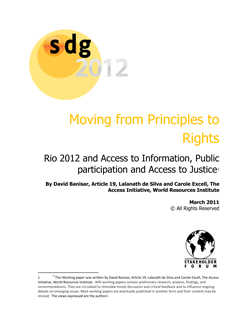Conference urges reviewing of Arab development patterns and creation of sustainable development bodies
CAIRO: Officials and experts participating in a meeting of the United Nations Economic and Social Commission for Western Asia (ESCWA) called for seizing the opportunity of political and social changes of the Arab Spring to review adopted patterns of development with a view to addressing sustainable development challenges in the Arab region.
Participants agreed that failures in achieving development is mainly attributed to developed countries’ evasion of their obligations towards developing ones, as provided for in international conventions.
These were among the main findings of the Arab Regional Preparatory Meeting for the UN Conference on Sustainable Development (Rio +20), which was convened at the League of Arab States (LAS) headquarters in Cairo on Oct 16-17 by ESCW in cooperation with LAS and the UN Environment Program (UNEP).
Participants strongly called for enhancing existing national councils for sustainable development and creating new ones in countries lacking them, and noted that such bodies need to have robust terms of reference and structures in order to reinforce their ability to implement strategies, plans and programs for sustainable development. As for ‘green economy’, the conferees stressed that this label should not be used to create one exclusive vision of development to apply in all countries of the world. They agreed that in light of the global financial crisis, the Arab region cannot afford additional obligations if developed countries failed to provide adequate funding to achieve sustainable development.
At the conclusion of the two-day meeting, participants emphasized the need to identify and develop sustainable development indicators to assess achievements and progress made in the Arab region in this regard and to examine gaps and means of addressing them. They underlined the need to focus on technology transfer in ways that suit conditions of the Arab region and its developmental priorities, and to focus particularly on resettlement of technology and building national capacities to guarantee its use sustainability. They also agreed on the need to support marginalized groups, including women, children and youth, and emphasized the relevance of civil society’s involvement in developmental processes and promoting their views at decision-making forums.
Participants included government representatives from social, economic and environmental bodies concerned with sustainable development, in addition to representatives from UN agencies, LAS specialized agencies, financial institutions, civil society, private sector, academic institutions, and partner organizations responsible for implementing projects and activities related to the objectives and themes of Rio+20.
In 2010, the UN General Assembly decided to convene the UN Conference on Sustainable Development (UNCSD or Rio+20) in 2012 in Rio de Janeiro, Brazil, from 4 to 6 June 2012. This date marks 20 years since the adoption of Agenda 21 at the UN Conference on Environment and Development, held in Rio de Janeiro in June 1992. It also comes 10 years after the World Summit on Sustainable Development, which was convened in Johannesburg, South Africa, in 2002 and resulted in the adoption of the Johannesburg Plan of Implementation.
Original article published at www.uncsd2012.org

